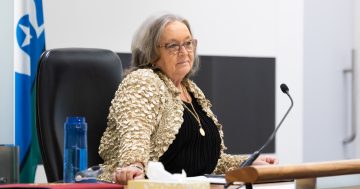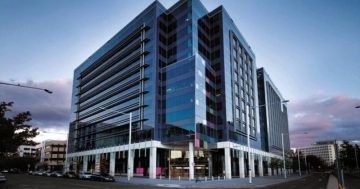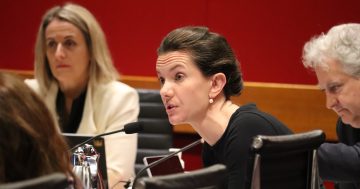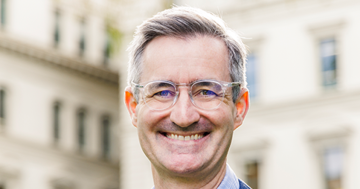In our continuing series of Email Interviews with local candidates in the coming Federal Election we bring you Troy Williams – the Liberals Candidate for Fraser.

Troy’s responses, in full and unedited, can be found below:
Q1 Provide a short (no greater than 200 word) employment application
style Resume (CV), including what work have you done apart from being
a politician or political staffer or party/union/lobby employee and
what experience or qualifications you have with regards to economic
management?
As CEO of a national trade association, I’ve had the chance to make a substantial contribution to the building profession by providing workplace training opportunities for older workers and graduates from universities. I’ve been able to tackle the challenge of climate change by successfully lobbying for building codes and standards that make our buildings more energy efficient.
Prior to accepting this appointment, I was CEO at the peak professional institute for those with an ownership or management interest in some 165,000 properties (valued at AUD$57billion) falling within a community titles / strata titled scheme in Queensland. During my time as CEO the organisation doubled in size, returned to financial stability and became influential in body corporate law reform.
In other roles I worked with industry and consumers to phase-out the use of chemicals that destroyed the ozone layer and travelled extensively overseas to promote Australia’s success in this area. This was really rewarding work that made a difference.
As a director of several peak industry groups, I’ve had the experience of working with government to ensure that our economy is properly structured to meet future and current challenges. We have spent a lot of time retraining workers to help them take advantage of new employment opportunities.
Q2 What would you like to see as the first piece of legislative change
brought about by your Government? What are your personal goals for
your first year representing the ACT?
Well, I’m fairly certain it won’t be “my” government as it would be pretty unusual to become PM straight from obscurity. However, as a new member I’ll be pushing for programs to further increase the rate of Medicare Bulk Billing in the Fraser electorate. Nationally it’s on the increase and non-referred GP attendances have increased by 10% from 68.2% in 2003/04 to 78.2% in the Jun 2007 quarter. Within Fraser it’s not yet up to the national average and I’ll be working at a local level to build upon the work that’s already been done to date.
Q3 What private opinions do you hold which are different to those of your party? On which issues do you disagree with your Party’s stated position?
Like many in the Coalition, I believe it is time to end discrimination of same-sex couples. The Human Rights and Equal Opportunities Commission (HREOC) report identified several important steps that should be taken in areas such as superannuation, welfare entitlements, and veterans benefits. The existing arrangements in these areas are not satisfactory.
Q4: Are you in favour of fixed election terms? Why or why not and if so
what length of term are you in favour of and why?
I’m comfortable with the current arrangements and for a long time I’ve held a view that the supremacy of the House of Representatives in deciding the tenure of the Prime Minister, and by implication the Government, must be paramount and on this basis fixed-terms run counter to this philosophy. However, in recent times my thoughts are changing and a three-year fixed term (that maintains the six year term of senators) could be an option so long as there was a mechanism to facilitate an early election if the Government failed to secure a majority in the House or the Senate was obstructionist and a double-dissolution was required. Four year terms for the House are problematic as I believe in the stability that a longer (and split) senate provides, but eight-year Senate terms is too long.
Q5: Do you think that it is important for the Prime Minister and their
family to live in Canberra? Why or why not?
If I’m elected as the MP for Fraser I’ll certainly be encouraging the Prime Minister to spend the majority of his time here in Canberra. However, like every other member of parliament the PM has a local community to represent so it’s not unreasonable that he remain accessible to the neighbourhood he represents and, most importantly, his family.
Q6 Do you consider that making observations about the structure and
makeup of the other major political party as beneficial to your own
party’s role in the election?
Sure, where there are fairly obvious flaws in the composition of the alternative Government. Around 70% of Labor’s front bench are union officials but only 15% of the private-sector workforce belong in a union. It seems that the only way to get ahead in Labor is to have a union background. For example, Labor had a farmer in the party, but he got booted out to make way for a senior union guy.
It’s no different in the seat of Fraser. The current member was a union official in Western Australia, then a party official there and later nationally before heading to the Senate, then off to the Seat of Canberra finally coming to rest in the Seat of Fraser. I don’t think he’s actually ever held a normal job in his life.
Q7 What are your thoughts on the permanent trading of water entitlements,
as per The National Water Initiative, and do you believe that
giving water a tradable, economic value is really the best method to
ensure that this scare Australian resource will be utilised sensibly
in the future?
The days where people used to use water to clean paved areas (rather than sweeping with a broom) and leave the running when washing the car are long gone. We need a balance of regulated and economic measures to encourage people to use less water.
It all makes sense and I’m all in favor of providing an economic incentive to save water so long as domestic residences (i.e. the water we use in our homes) are quarantined from commercial trading arrangements. It’s great news that a re-elected Coalition Government will help secure the future reliability of ACT and Queanbeyan water supplies by transferring ownership of Googong Dam to the ACT Government with the condition that Queanbeyan will receive a dedicated entitlement from the Dam.
Q8 Canberra has a large student population and Govt funding per capita
for public education facilities seems to be on the slide with there
being an apparent shift towards encouraging more people to enter the
private education sector. What are your thoughts on this?
Insofar as Commonwealth funding of schools is concerned the question is based upon a false premise because funding has increased. At a local level, I’ll be an effective advocate for our primary and secondary schools and I understand the harm that ACT Labor’s school closures have caused – in my final year of college my own school was closed by a state Labor government. The Coalition Government has used the dividend of a strong economy to:
* Increase federal funding for State schools by 70% in real terms since 1996, while enrolments have increased by 1.2% over that time.
* Provide funding for specific purposes, such as the $1.2 billion Investing in Our Schools Programme and the $1.8 billion Literacy, Numeracy and Special Learning Needs Programme.
An important fact that is often overlooked is that 67% of students are in State Government schools and receive 75% of total taxpayer funding.
What initiatives would you pursue in regard to HECS fees, full fee
paying uni courses, increasing/decreasing Austudy payments, funding
for education/ R&D/communications infrastructure and assistance or
encouragement to private sector research and technology companies?
When it comes to research and development funding, the “Backing Australia’s Ability” initiative provides $5.3billion over seven years to support local research. The Cooperative Research Centres (CRC) provide a opportunities for universities and the private sector to collaborate on research and translate it for use by our community.
Small business undertaking research benefits through the “Commercial Ready” program that aims to stimulate greater innovation and productivity growth in the private sector by providing around $200 million per year in competitive grants to small and medium-sized businesses (SMEs). A wide range of project activities can be supported, extending from initial research and development (R&D), through proof of concept, to early-stage commercialisation activities.
University finding now stands at around $8.5billion which is much better than the $5billion Labor was funding when it left office. The recent allocation of $6 billion into the “Higher Education Endowment Fund” provides additional ongoing funding for capitals works and, importantly, this initiative allows individuals and companies to contribute to the fund too, providing opportunities for further growth.
What measures will you take to ensure the best possible education is
available to all Australians?
I like choice in our education system in which a properly funded and resourced public education system is augmented by the private school sector. We need to provide a system of incentives to reward the really good teachers that takes into account external parameters such as the past performance of the students and schools.
Q9 What’s the single most pressing issue in your electorate (local
electorate issue – not a broader issue that has an impact on your
electorate) and how do you plan on addressing it?
Security of our water supplies is arguably the most important issue and I’ve already referred to the transfer of the Googong Dam.
Unlike other capital cities we can’t just whack up a desalination plant so we need to increase the roll-out of water efficient toilets, shower roses and taps in our existing homes and offices and further enhance measures to further reduce water consumption. In my current role I’ve been involved in some fairly exciting projects that work towards these objectives and I’d welcome the opportunity to use my expertise in this area to facilitate legislative change.
Q10 Suppose that you and I are stuck in an elevator for 5 minutes. You
know nothing about me other than I’m enrolled to vote in your
electorate. What do you say to convince me to vote for you.
Well first I’d press the alarm button or call the maintenance company – a fairly practical step.
Normally I just start singing Herman’s Hermits “Henry VIII” over and over again which normally makes people give in – my singing has that effect, for better or worse. However, I’ll accept that this tactic is probably not going to win me the seat, unless we get some very large speakers and rig them up everywhere.
Seriously though, politicians often talk way too much and a five minute speech from me wouldn’t be all that exciting, my dog can attest to that having listened to me practice several. Being a parliamentary representative means helping our community, so the first thing is to develop an understanding of what’s important to the poor sod I’m stuck in an elevator with. I’d explain that over more than a decade I’ve been working with employees and employers to develop workplace training opportunities, foster sustainable development and help business to meet the challenges of global warming. This is practical experience that is relevant to people’s every day lives and has really allowed me to understand issues that many locals face. We would discuss opportunities to address affordable housing, delivering more effective health care.





















